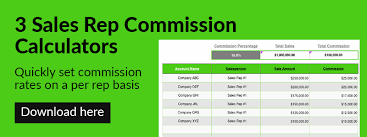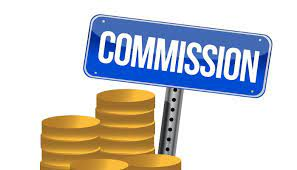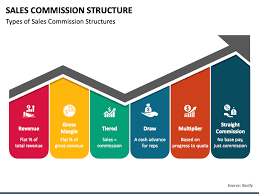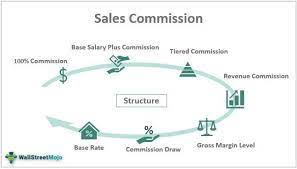
Sales calculate sales commissions and are a critical component of any sales organization or team’s compensation structure. A sales commission is a financial incentive for salespeople to achieve a specific sales target or goal.
Sales commissions are typically a certain percentage of the sales revenue the salesperson generates. This article will discuss everything you need to know about sales commissions, including what they are, how they work, and how to create a commission agreement.
What is a Sales Commission?
A sales commission is a monetary incentive paid to salespeople that companies pay them for achieving a specific sales goal or target. Sales commissions are usually a percentage of the sales revenue the salesperson generates. Sales commissions vary widely depending on the industry and the individual sales-person’s role, but they are typically between 2% of gross revenue and 10% of the total sales revenue.
How Do Sales Commissions Work?
Sales commissions provide a financial incentive for salespeople to achieve specific sales goals or targets. Sales commissions can be calculated in various ways, but they are typically a percentage of the sales revenue generated by the salesperson.
For example, if a salesperson generates $100,000 in sales and their commission rate is 5%, they would receive a commission payment of $5,000.
Creating a Sales Commission Agreement:
A sales commission agreement is a document that outlines the terms and conditions of a salesperson’s compensation, including their full pay sales commission, rate, and the types of sales commission goals they are expected to achieve.
When creating a sales commission agreement, several vital components should be included:
Commission Rate: The commission rate per sales position is the percentage of the sales revenue the salesperson will receive as a commission payment per sales or pay period.
Sales Goals: The sales goals should be specific and measurable and outline what the salesperson is expected to achieve to their sales quota and earn their commission.
Commission Payment Schedule: The commission payment schedule should outline when the salesperson will receive their commission payments and how they will be paid (e.g., by check, direct deposit, etc.).
Termination Clause: The termination clause in the sales commission structure outlines all the circumstances under which the sales commission agreement can be terminated and what happens to the salesperson’s commission payments in the event of termination.
Confidentiality Clause: The confidentiality clause outlines the salesperson’s responsibility to keep confidential any proprietary or confidential information they may receive as part of their sales role.
Sales commissions are an essential component of any sales team’s compensation plan and structure. They provide a financial incentive for salespeople to achieve specific sales goals or targets and help to motivate sales reps and teams to perform at their best.
Therefore, when creating a full sales compensation plans and commission agreement, it is essential to include all the vital components, including the commission rate, sales goals, commission payment schedule, termination clause, and confidentiality clause.
Creating a clear and comprehensive sales compensation plan and commission agreement ensures that your whole sales force or team is motivated, engaged, and performing at their best.

Commission Rate:
The commission rate is crucial to any sales commission agreement, as it determines a certain percentage of the commission the salesperson will receive for each sale.
Commission rates can vary depending on the industry, the type of product or service being sold, and the salesperson’s role. Therefore, it is essential to set a commission rate that is fair and reasonable for both the salesperson and the company.
Sales Goals:
Sales goals are specific and measurable targets the salesperson expects sales associates and sales representatives themselves to achieve to earn their commission.
Sales goals can be based on various metrics, such as the total sales revenue generated, the number of new customers acquired, or the percentage of sales made to existing customers. Setting clear and achievable sales goals is essential to motivating sales reps and sales teams to perform at their best.
Commission Payment Schedule:
The commission payment schedule outlines when the salesperson will receive their commission payments and how they will be paid. Commission payments to sales representatives and agents can be made in various ways, such as by check, direct deposit, or PayPal.
Therefore, it is essential to establish a clear payment schedule to ensure that salespeople receive their commission payments promptly and that sales agents and reps are motivated to continue performing at a high level.
Termination Clause:
The termination clause outlines the circumstances under which the sales rep’s commission agreement can be terminated and what happens to the salesperson’s commission payments in the event of termination. The termination clause should be carefully worded to ensure that both the salesperson and the company are protected in case of a dispute or termination of the agreement.
Confidentiality Clause:
The confidentiality clause outlines the salesperson’s responsibility to keep confidential any proprietary or confidential information they may receive as part of their sales role. This clause is essential in industries where intellectual property or trade secrets are vital to the company’s competitive advantage.
Creating a sales commission agreement is essential in establishing a clear and compelling sales compensation structure.
You can ensure that your sales team is motivated, engaged, and performing at their best by including key components such as the commission rate, sales goals, commission payment schedule, termination clause, and confidentiality clause.
Remember everything you need to know about sales commission: set clear and achievable sales goals, establish a fair and reasonable commission rate, and pay commissions promptly to motivate and engage your sales team.

Best Practices for Sales Commission Agreements:
Keep it Simple and Clear: It’s essential to keep your sales commission agreement as simple as possible. Avoid using legal jargon that may be difficult for the other sales rep or team to understand. Instead, ensure the deal is easy to read and includes all necessary details.
Define Key Terms: Clearly define key terms used in the agreement, such as “commission,” “sales goals,” and “termination clause.” This will help prevent misunderstandings or disputes down the line.
Be Specific: Provide details regarding commission rates, sales goals, residual commission structure and amount, and commission payment schedules. This will help salespeople understand precisely what is expected of them and how they will be compensated.
Provide Incentives: Incentivize your high performing sales reps and team by offering bonuses for exceeding sales goals or closing large deals. This will keep sales rep retention and help keep your sales rep and team motivated and engaged more sales reps and more.
Include Clawback Provisions: Clawback provisions allow companies to have sales reps receive recover commission payments if a sale is later canceled or the salesperson breaches the terms of the agreement. Including clawback provisions in your sales rep’s commission and agreement will help protect your company’s interests.
Please Review and Update Regularly: Review and update your sales commission agreement regularly to ensure it remains relevant and practical. This will help ensure that your sales team remains motivated and engaged.
In conclusion, a well-designed sales commission agreement is essential for motivating and engaging your sales team. By including key components such as an apparent commission rate, specific sales goals, a fair commission payment schedule, and termination and confidentiality clauses, you can create an agreement that is easy to understand and encourages top performance from your sales team. Remember to keep it simple, incentivize your sales team, include clawback provisions, and review and update regularly to ensure your agreement remains effective.

The legal implications of your sales commission agreement
It’s also important to consider the legal implications of your sales commission agreement. In addition to consulting with your legal team, you may want to consider seeking input from your own sales management team to ensure the deal is fair and the residual commission is reasonable.
In terms of commission rates, there is no one-size-fits-all solution. Instead, commission rates can vary depending on several factors, including the product or service sold, the salesperson’s experience and performance, and the competitive landscape.
When designing your own revenue commission structure and payment schedule, balancing incentivizing your sales team and managing your cash flow is essential. Consider regularly offering revenue commission structure and payments (such as monthly or quarterly) to help your sales team manage their finances while keeping your financial goals in mind.
Finally, remember that your best sales rep receives commission structure, and agreement is just one component of a successful sales strategy. In addition to offering your sales talent a fair and motivating sales commission structure yourself, it’s also essential to provide your top sales rep and team with the training, resources, and support they need to be successful.

Types of Commission Structures There are several types of commission structures, including:
Straight Commission: This type of straight-line commission plan structure pays a percentage of the sales revenue gross profit margin commission that the sales professional generates. The straight-line commission plan and rate may vary based on the product or service being sold.
Salary Plus Commission: This commission structure pays both a base salary and a commission salary. The base salary plus commission is typically lower than the sales professional’s earnings in a straight commission base pay structure but provides a stable income.
Commission-Only: In this structure, sales professionals receive no base salary and are only paid commission on sales they make. This can be a high-risk, high-reward option for sales professionals.
Pros and Cons of Commission Structures
Each commission structure has its advantages and disadvantages.
Straight Commission Pros:
- High earning potential
- Encourages sales professionals to work hard to generate revenue
Straight Commission Cons:
- Lack of stability in income
- Sales professionals may focus on high-ticket items, ignoring low-margin products
Salary Plus Commission Pros:
- Stable income
- Motivates sales professionals to work hard to increase sales
Salary Plus Commission Cons:
- Lower earning potential than a straight commission structure
- Sales professionals may focus on lower-margin products
Commission-Only Pros:
- High earning potential
- Sales professionals have complete control over their income
Commission-Only Cons:
- Lack of stability in income
- High risk for sales professionals, especially in a competitive market
How to Negotiate the Best Commission Structure Negotiating right the best sales commission structure and the best absolute commission structure and base salary and pay structure for your sales role requires preparation and research. Here are some tips to help you get the best commission structure:
Research the Industry Standard: Research the typical gross margin commission and revenue commission model and structure used for your industry and position to understand what your revenue and gross margin commission are that you can expect.
Know Your Worth: Understand your value to the customer who pays the company and use it to negotiate a fair commission structure.
Be Prepared to Negotiate: Come prepared with data and a clear understanding of what you want from the commission structure.
Consider the Long-Term: Look beyond the immediate benefits of a commission structure and pay period and consider how it will impact your income, job security, and career growth in the long term.
In conclusion, commission structures for sales roles can be complex and vary depending on the industry and position. Understanding the pros and cons of each type of base pay, salary plus commission, territory volume commission, or types of sales commission structure and negotiating the best commission structure for your sales role can help you maximize your earning potential and career growth.

Commission structures are just one part of a sales compensation package
It’s important to note that the sales commission structures above are just one part of a sales compensation plan and package. Other factors, such as bonuses, benefits, and equity, should also be considered when negotiating a sales compensation plan.
Additionally, average sales commission rates and structures can vary depending on the sales goals and objectives of the company. For example, a company may have a territory volume commission plan or offer a higher commission rate for selling a new product or meeting specific sales quotas. Therefore, it’s essential to stand the company’s sales goals and objectives and how they may impact your sales commission structure below.
When negotiating a commission structure, it’s also essential to consider the company’s culture and values. For example, a company that values teamwork and collaboration in the sales process may offer a different commission structure to its sales teams and employees than one that focuses solely on individual sales performance.
In addition to the sales process, negotiating your commission structure, tracking your sales performance, and ensuring that you meet your sales goals are essential. This will help you earn more commission and demonstrate your value to sales leaders in the company and potentially lead to more sales and career advancement opportunities.
Understanding the different types of sales incentives and sales commission structures, their pros and cons, and how to negotiate the best commission structure for your sales role can help you maximize your earning potential and succeed in your sales career.
CoopBusiness is a revolutionary cooperative business-building platform that empowers individuals to become entrepreneurs, business owners, and financially independent.
As a member, you’ll receive top-level business mentorship, access to our proprietary business systems, and the opportunity to access the funds you want to turn your business ideas into reality.